What is the story about?
What's Happening?
Recent studies published in ACS journals have revealed innovative ways to utilize food waste, transforming it into valuable resources for agriculture and medicine. Researchers have found that sugar beet pulp, a by-product of sugar extraction, can be converted into carbohydrates that enhance plants' immune responses, reducing the need for synthetic pesticides. This discovery was tested on wheat, showing effectiveness against fungal infections like powdery mildew. Additionally, coconut fibers processed by millipedes, termed 'millicompost,' have been identified as a sustainable alternative to peat moss for seedling growth, particularly for bell peppers. Furthermore, radish leaves, often discarded, have been found to contain fiber and bioactive compounds that promote gut health. Lastly, beet greens have been processed into microparticles that preserve their antioxidant properties, offering potential applications in food, cosmetics, and pharmaceuticals.
Why It's Important?
These findings highlight the potential of food waste as a sustainable resource, offering eco-friendly solutions to agricultural challenges and contributing to health and wellness sectors. By reducing reliance on synthetic pesticides, the use of sugar beet pulp can lead to more sustainable farming practices, benefiting both the environment and agricultural productivity. The development of 'millicompost' provides an alternative to peat moss, which is often sourced from vulnerable ecosystems, thus promoting environmental conservation. The nutritional benefits of radish leaves and the preservation of beet greens' bioactive compounds could lead to advancements in dietary supplements and health products, enhancing human health and well-being. These innovations demonstrate the potential for food waste to contribute significantly to sustainable development and resource efficiency.
What's Next?
Further research and development are likely to focus on scaling these discoveries for commercial use, potentially leading to new products in agriculture and health industries. Stakeholders such as farmers, environmentalists, and health professionals may explore partnerships to integrate these sustainable practices into mainstream applications. Regulatory bodies might also consider guidelines to support the adoption of these eco-friendly solutions, ensuring safety and efficacy in their use. As awareness grows, consumer demand for sustainable and health-promoting products could drive market expansion, encouraging more research into the untapped potential of food waste.
Beyond the Headlines
The transformation of food waste into valuable resources raises ethical and cultural considerations regarding waste management and sustainability. It challenges traditional perceptions of waste, encouraging a shift towards viewing discarded materials as opportunities for innovation. This approach aligns with global sustainability goals, promoting responsible consumption and production. Additionally, the integration of these practices could influence cultural attitudes towards food waste, fostering a more conscientious and resource-efficient society.
















